|
|
|
Sort Order |
|
|
|
Items / Page
|
|
|
|
|
|
|
| Srl | Item |
| 1 |
ID:
078027
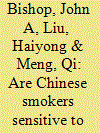

|
|
|
|
|
| Publication |
2007.
|
| Summary/Abstract |
We estimate cigarette price and income elasticities for urban China, 1995. We find an overall cigarette price elasticity of 0.5, which lies between previous estimates. This implies that a 10% increase in price would result in a decline in cigarette consumption of 4.5 billion packs and would raise Y34 billion in additional tax revenue.
|
|
|
|
|
|
|
|
|
|
|
|
|
|
|
|
| 2 |
ID:
159039
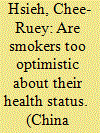

|
|
|
|
|
| Summary/Abstract |
As the world has moved toward the era of non-communicable diseases, whether the individuals are in a capable position to accurately evaluate their own health status has an important implication on disease prevention in particularly and population health outcome in general. In this paper, we address four important questions surrounding the accuracy of health perception: (1) to what extent that individuals can make an accurate evaluation on their own health status; (2) what are the major factors influencing health misperception if any; (3) what are the causal directions between health behavior and health perception; and (4) whether individuals can learn and update their self-evaluation on health status over time and whether such learning is productive in that it mitigates the health misperception. Specifically, we use a longitudinal data set obtained from Taiwan that covers six waves of survey over about twenty-year period to compare the ex ante subjective perception on health and the ex post mortality hazards. Our results suggest that over one third of the survey respondents are not performing well in the evaluation of their own health status. We also find that smokers are more likely to have an optimistic bias on their own health assessment as compared to nonsmokers. After controlling for the simultaneous causality problem, we find a causal effect of individuals' misperceptions on continuing smoking, but not vice versa. In addition, our results show that individuals update their subjective perception on health over time through the learning from personal health shocks and the provision of public information on smoking hazards. Although the learning process tends to be overshooting among smokers, it is beneficial to mitigate the optimistic bias. We also find the evidence that personal health shock has a stronger impact on updating behavior than public information, indicating that personal experience is a more effective channel through which to correct the bias in health perception, compared to the provision of public information, such as anti-smoking campaign.
|
|
|
|
|
|
|
|
|
|
|
|
|
|
|
|
| 3 |
ID:
101155
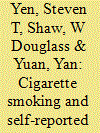

|
|
|
|
|
| Publication |
2010.
|
| Summary/Abstract |
The effect of cigarette smoking on self-reported or assessed health (SAH) has been considered in several studies, with some surprising results, but smoking behavior has received less attention in studies in countries like China, than in the United States and various European countries. In this manuscript the variation in an ordinal endogenous SAH variable is modeled with an ordinal endogenous cigarette smoking variable, using the copula approach to accommodate skewness in the error distribution. The treatment approach avoids several selection issues that could bias empirical estimates. The empirical model is estimated for a random sample of adult males from nine Chinese provinces in the 2006 China Health and Nutrition Survey. The results for our sample suggest that heavy smokers are more likely to report excellent health. Government and those in health policy might target heavy smokers with the message that quitting does result in benefits, keeping in mind that their own reported assessment of their health is itself a function of several factors.
|
|
|
|
|
|
|
|
|
|
|
|
|
|
|
|
| 4 |
ID:
143587
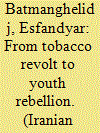

|
|
|
|
|
| Summary/Abstract |
Focusing on the cultural influence of the cigarette, this paper synthesizes a wide range of evidence to argue that the cigarette was a fundamental primer for Iran's encounter with modernity, especially as understood in the context of western influence. Applying the dramaturgical theories of sociologist Erving Goffman, it is argued that the cigarette is an instantiation of the “sign-equipment” of modernization used to refashion the identity and subjectivity of Iranian men and women. This refashioning has occurred in three distinct periods. In the first period (1860–1930), cigarette smoking was a habit adopted by the Persian elite in an attempt to mediate the encounter with European colonial figures. In the second period (1930–70), cigarettes were leveraged by Iranians who wished to be seen as upwardly mobile. In the final and contemporary period (1970–present), cigarettes have become ubiquitous among the adult population, but smoking itself has become the act of youth rebellion as experimentation occurs at increasingly young ages.
|
|
|
|
|
|
|
|
|
|
|
|
|
|
|
|
| 5 |
ID:
188974
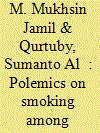

|
|
|
|
|
| Summary/Abstract |
This paper examines various views, ideas, opinions, understandings, and interpretations among Indonesian societies, including Islamic scholars and Muslim social organizations toward tobacco products and smoking practices. It also traces the history and contemporary developments of smoking practice in Indonesia. Historically, as the article shows, smoking for Indonesian societies is not simply inhaling tobacco but also a medium of social interaction and ritual practices. Moreover, this study investigates whether religious pronouncements and fatwas (Islamic edicts) on smoking, issued by some noted Islamic institutions in the country, influence smoking practices and behaviors among Indonesian Muslims. Given the vitality of religion and smoking among Indonesians, it becomes interesting to study the relationship between the two.
|
|
|
|
|
|
|
|
|
|
|
|
|
|
|
|
|
|
|
|
|